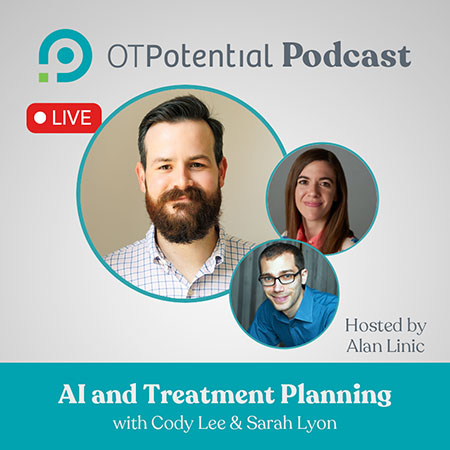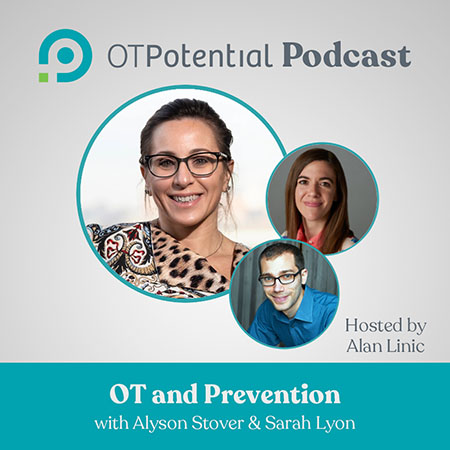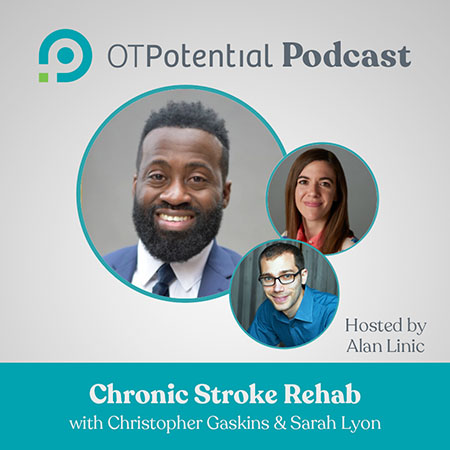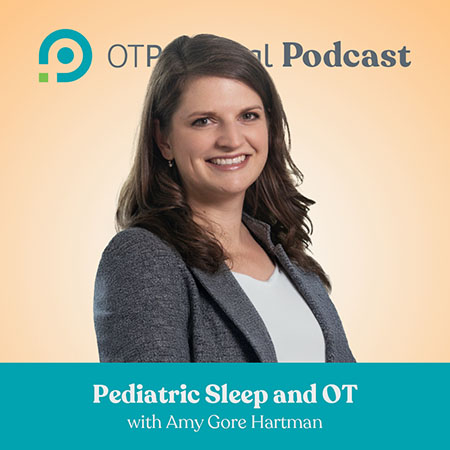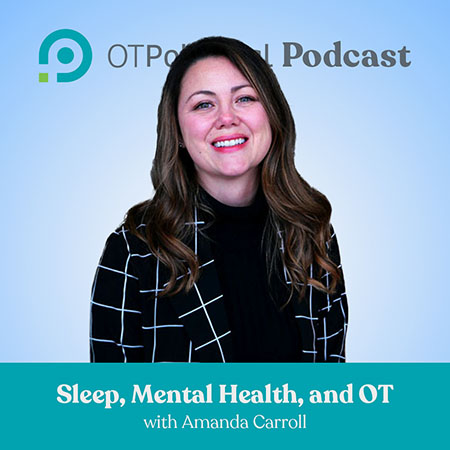Earn 1 hour of continuing education by joining OT Potential after taking this course.
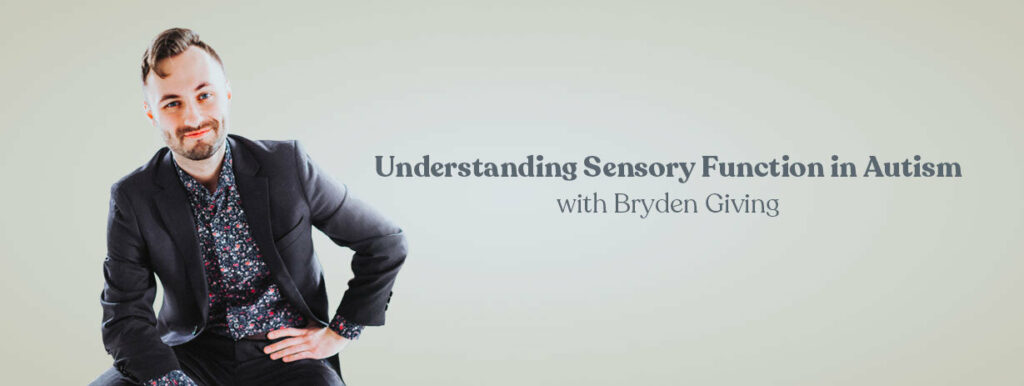
Listen: Apple | Spotify | Google
In neuroscience, there is a rapidly growing and evolving understanding of sensory function that is important for all occupational therapists to be tracking—and particularly those who work with autistic clients.
In this one hour continuing education course, we’ll dive into a research review, where the authors take three main assumptions that both neuroscientists and occupational therapists make regarding sensory function—and they discuss where the research stands with each one.
You’ll leave this article feeling humbled by how much we still have to learn about sensory function and autism. Yet, also in awe of the advances we have made over the past few decades—one can only imagine what we will learn in future years!
After we look at some specific research on this topic, we’ll be bringing in our expert guest, Bryden Giving, MAOT, OTR/L. Bryden will help us connect this complex topic to your works on the frontlines.

Earn 1 hour of continuing education
1. Listen to the podcast for free.
2. Sign up for the OT Potential Club.
3. Pass the quiz and download your certificate!
Primary Research Explored
When you log in, be sure to check out the OT Potential Club’s written breakdown of the following research article, then share your questions and thoughts with fellow practitioners.
Secondary Research
- Multisensory integration and the society FOR Neuroscience: Then and now
- Audiovisual multisensory integration in individuals with autism spectrum disorder: A systematic review and meta-analysis
Learning Objectives
- Based on the research, you will be able to describe how sensory function differences have been confirmed in people with autism.
- Based on the research, you will be able to identify how our understanding of the sensory system has evolved over the past decades.
- Based on the research, you will be able to recognize gaps that remain in our understanding of sensory function in autism.
Agenda
Intro (5 minutes)
Breakdown and analysis of journal article (10 minutes)
- Why was this paper written?
- How the goals, values, and approaches of OT and neuroscience differ
- 3 shared perspectives—and where the research stands behind each one.
- Shared perspective #1: atypical behavioral responses to sensory stimuli are a consequence of atypical neural processing.
- Shared perspective #2: differences in sensory function may explain higher-level deficits in people with autism.
- Shared perspective #3: sensory function may be malleable with treatment.
- Authors’ conclusion and recommendations
- Takeaways for OT practitioners
Discussion on practical implications for OTs (with guest Bryden Giving) (45 minutes)
- What were your general impressions of the research?
- How does this research fit with your current understanding of sensory function in autism?
- Sensory function is so complex! What are some strategies you use for explaining it to parents?
- Do you talk about sensory function with the kids on your caseload? If so, how do you explain it?
- How do you factor sensory function into your treatments?
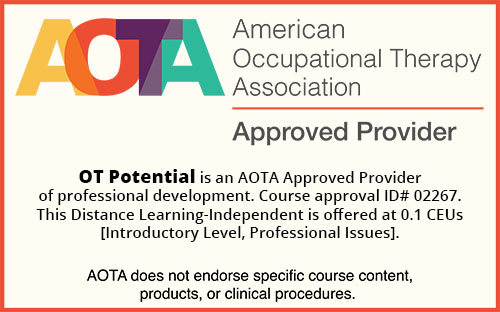
Instructional Methods/Registration/Special Needs Requests/Cancellation Policy
This course is an independent/self-study course delivered via podcast on iTunes, Spotify, Google Play & more.
If you need accommodations to take this course, please contact us and we will address your needs on an individual basis.
If we cancel a promoted course, event, live stream, or any other paid CEU offering prior to release, and you subscribe explicitly for said offering, you are eligible for a full refund if you did not complete and earn any other CEU quizzes or certificates during your subscription.
If a live webinar is cancelled that you signed up for, our system will automatically generate an email to you and if possible, we will inform you of the rescheduled date. Our most current webinar schedule will be found at: otpotential.com/live-ot-ceu-webinars.
Course Completion Requirements
In order to receive a certificate for this course, you must first participate in the podcast/webinar in its entirety. Then, you will need to take the quiz that will accompany the course and earn 75% or higher. If you pass, a certificate will be automatically generated and sent to your email. Quizzes for live (distance learning–interactive) webinars must be completed within 3 days of completing the webinar.
Target Audience/Educational Level
Our target audience is occupational therapy practitioners who are looking to establish a baseline understanding of where the research stands on autism and sensory function. The educational level is introductory.
Financial and Non-financial Disclosures
It is the policy of OT Potential to disclose any financial and non-financial interest the provider or instructor may have in a product or service mentioned during an activity. This is to ensure that the audience is made aware of any bias of the speaker.
We here at OT Potential have no financial stake in this topic. Our guest, Bryden Giving, has no financial interest in this topic to disclose.
Speakers
Bryden Giving, MAOT, OTR/L:

Bryden Giving is a recent graduate coupled with experience in research, evidence-based practice, and occupation-centered treatments for children. Bryden’s passion areas are amplifying the voices of the disabled community in addressing ableism within the allied health professions and advocating for a return to occupation-based practice within pediatric occupational therapy. Bryden’s love for learning has led him to pursue a post-professional doctorate in occupational therapy at St. Catherine University in Saint Paul, MN to help continue his work in shifting our impairment-based perspective to a social model of disability for our pediatric patients. Read full bio.
Sarah Lyon, OTR/L:

Sarah’s passion is helping fellow OT practitioners translate evidence into daily practice. Sarah earned her BA in religion from St. Olaf College, then earned her master’s degree in occupational therapy from New York University in 2011.
Since then, she’s worked in numerous facilities, including a critical access hospital, an acute trauma hospital, and a state inpatient psychiatric hospital. Sarah is the founder/owner of OT Potential. Read more about OT Potential here.
This course was designed to meet your continuing education requirements
We designed the courses in the Club to meet the requirements for “online” and “independent/self-study” courses. To verify the requirements from your specific state (within the US), check out our post, OT Continuing Education Requirements. If you are outside of the United States and have questions, please contact us.
We are proud to be an AOTA Approved Provider and to meet the requirements for your NBCOT renewal.
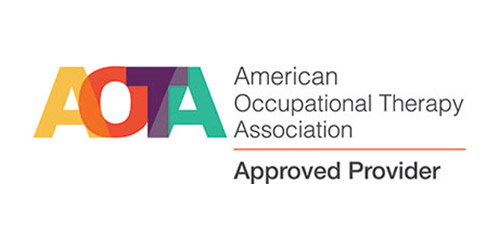


See our other OT courses!
Understanding Sensory Function in Autism • OT Potential
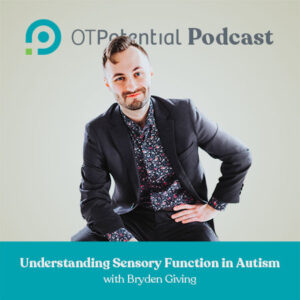
Today, we’ll be covering “Understanding Sensory Function in Autism.” We’ll look at new research and discuss it with Bryden Giving.
Course Provider: Organization
Course Provider Name: OT Potential
Course Mode: Online
Start Date: 2021-04-19
Duration: 01:00:00
Course Type: Subscription
4.77

